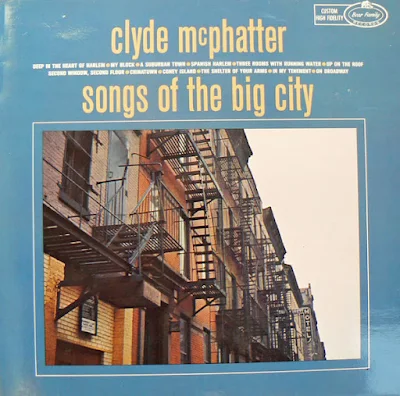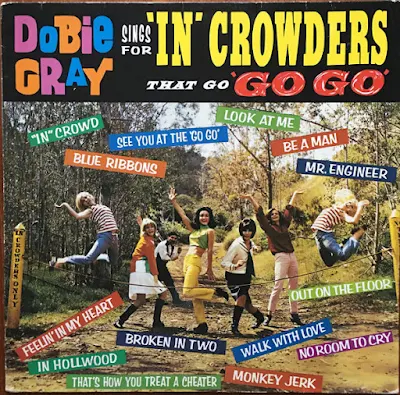Habanera Rock, Part Two
South Of Spanish Harlem
The 1960s Habanera Rock Revolution
by Hampton Jacobs
People bought records by The Drifters, Frankie Valli + The Four Seasons, and Jay + The Americans fully expecting to hear Latin dance rhythms. Largely due to the overwhelming success of "Spanish Harlem," Ben E. King was considered more or less the King of Habanera Rock. A new Gene Pitney record was more often than not going to have a south-of-the-border sensibility; the same can be said for Lou Christie and Chuck Jackson's records, and Dionne Warwick could be counted on every time to give that upstart Girl from Ipanema a run for her money!
Profits from The Shirelles' 1960 smash hit "Will You Love Me Tomorrow?" guaranteed that most of their subsequent singles would have some kind of Latin orientation. As indicated in Part One, girl groups and girl soloists like The Shirelles, The Chiffons, The Angels, Lesley Gore and Little Peggy March were some of the most consistent Habanera rockers. However, much has been written about them in recent years, so here's a sampling of Latin-tinged Rock 'n' Roll from some of the most popular male vocalists of the era. To emphasize the broad scope of the Habanera Rock movement, we've chosen several albums that were recorded far from its epicenter in New York City.
Spanish Harlem
Ben E. King
The monarch displays his crown jewels on this fine collection of Latin standards, assembled into a theme album for the purpose of showcasing his first hit single. Truth be told, it's not really Rock 'n' Roll, but it swings, and it's a virtual textbook of Latin styles. Jerry Leiber, Mike Stoller and the incredibly gifted Stan Applebaum guide King Benny through a musical smorgasbord of cha-cha-chás, sambas, tangos, boleros, pasodobles and Latin Jazz rhythms. (Ironically, the title track is the only baião to be found in the set.) While His Majesty's readings of big orchestra numbers like "Granada" and "Perfidia" are merely competent, he sizzles on romantic items like "Sway," "Bésame Mucho," "Come Closer To Me" and "Perhaps, Perhaps, Perhaps." The supremely silly lyrics of "Sweet And Gentle" (an English translation of the Cuban song "Me Lo Dijó Adela") don't prevent it from being the best version sung by a non-Latin vocalist. Benny's own attempt at penning a Latin song, "Love Me, Love Me, Love Me," is quite respectable.
A Leiber-Stoller Production
Arranged and Conducted by Stan Applebaum
released in 1960
Songs Of The Big City
Clyde McPhatter
Clyde McPhatter founded The Drifters back in 1953, but he didn't stick around long enough to benefit from Leiber and Stoller's Latin Soul stylings. Here, with arranger Alan Lorber's help, he comes to terms with the habanera and baião rhythms his former group has been spreading all over Pop radio. The stunning "Deep In The Heart Of Harlem" paints a spare but richly textured urban tableau; lyrically, it could almost be the male answer to The Crystals' "Uptown." Clyde's fragile tenor lends a bittersweet flavor to covers of Ben E. King's "Spanish Harlem," Sammy Davis, Jr's "The Shelter Of Your Arms," and The Drifters' "On Broadway" and "Up On The Roof." He gets the chance to express some tongue-in-cheek humor (perhaps a little too cheeky) with amusing novelty items like "A Suburban Town," "Coney Island" and "Chinatown." The latter tune, more of a pseudo-Asian music pastiche than a Habanera rocker, must surely be the worst thing Howie Greenfield and Helen Miller ever wrote! With its stereotypical ching-chang, a-ching-a-ling-a-lang coda, it's just plain embarrassing. Whatever could they have been thinking?
A Shelby Singleton Production
Arranged and Conducted by Alan Lorber
released in 1964
Arranged and Conducted by Alan Lorber
released in 1964
And Sings, And Sings
Freddie Scott
This is one of the most coveted Screen Gems Music productions. Especially hard to find in stereo, Gary Sherman's sublime Latin charts make it well worth the expense of seeking out. With Ray Charles' favorite girl group The Cookies backing him up in the studio, the late Freddie Scott spoons his rough-hewn Blues vocals over creamy Pop ballads and juicy sambas and bossa novas. The flavor is absolutely delectable! "Hey, Girl" was the culmination of everything Gerry Goffin and Carole King learned from Leiber and Stoller; it blanketed Pop radio and quickly became the only break-up ballad anybody wanted to hear in the summer of '63. Freddie's powerful rendition of "Where Is The Girl?," an obscure but frequently waxed Leiber and Stoller baião, is easily the best version of this song. Maestro Sherman revamps the folk standards "Where Have All The Flowers Gone?" and "If I Had A Hammer" with breezy Caribbean rhythms, and the resulting tracks are simply gorgeous. Every cut of this album is superb, and you really hate to hear it come to an end.
Arranged and Conducted by Gary Sherman
Produced by Gerry Goffin and Carole King
under the supervision of Don Kirshner
released in 1963
Produced by Gerry Goffin and Carole King
under the supervision of Don Kirshner
released in 1963
Spanish Lace
Gene McDaniels
This Kansas City native damn near usurps Ben E. King's crown with his highly polished renditions of Spanish, Cuban, Mexican and Brazilian standards. Although recorded in Hollywood, this is arguably a better Latin Pop album than Spanish Harlem, whose title track is covered marvelously here. With Tommy "Snuff" Garrett at the production helm, you shouldn't wonder why. Garrett was fanatical about Latin music and culture, and the dozens of albums he cut with his instrumental studio group 50 Guitars contained Latin songs far more often than any other kind. Members of 50 Guitars (including Phil Spector session stalwart Tommy Tedesco) played on dates for Gene McDaniels, Bobby Vee, Johnny Burnette and most other Liberty Records artists. Their authentic Spanish strumming make these twelve sides sound like they might've come from a 1940s movie musical starring Desi Arnáz. Gene's hit single "Spanish Lace," later cut by The Drifters, hails from the Pomus/Shuman songbook.
A Snuff Garrett Production
Arranged and Conducted by Ernie Freeman
released in 1962
released in 1962
Terry Stafford
This rare stereo album, produced in Hollywood for one of the more talented Elvis Presley clones, features the fruitiest Latin arrangements you're ever likely to hear! Crusader Records prexy John Fisher serves up a tangy bowl of Pop/Rock menudo filled with bubbly Farfisa organ playing, popcorn bass accents, breathy femme vocals and a crisp echo that makes the tracks sound like they were cut in your brother-in-law's garage! Tangos, rhumbas and sambas are the Latin rhythms on tap here; highlights include "Invitation To A Kiss," "Pocket Full Of Rainbows," "Kiss Me Quick!" (like the title track, penned by Doc Pomus and Mort Shuman and originally waxed by Elvis), and the delicious "Margarita."
Arranged and Conducted by Bob Summers
Produced by John Fisher
released in 1964
Produced by John Fisher
released in 1964
Dobie Gray Sings For In-Crowders
That "Go-Go"
Dobie Gray
Years before the release of his signature song, the Pop/Country rocker "Drift Away," Dobie Gray was a stone Country singer. He emphasizes the down-home side of Soul music on most of this album's selections, which even include some bonafide Country tunes. However, the hit singles "The In-Crowd" and "See You At The Go-Go" are Spectorized Latin boogaloos arranged by Gene Page, the guy who also did the honors on Phil Spector's magnificent Righteous Brothers record, "You've Lost That Lovin' Feelin." Those singles, as well as the rest of this album's tracks were recorded at Hollywood's Gold Star Studios where Spector cut most of his sessions. Spector's favorite backing vocalists Darlene Love and The Blossoms are on hand to harmonize. While Dobie may sound like he belongs on a "Grand Ole Opry" telecast, he's plenty versatile enough to sing boogaloos, and he puts across a convincing tango rocker, too. He turns in excellent habanera readings of Jackie DeShannon's "Blue Ribbons" and of his self-penned songs "In Hollywood" and "Walk With Love."
An Atlas Artists Production
Produced by Fred Darian
under the supervision of Harry Maselow
released in 1965
Produced by Fred Darian
under the supervision of Harry Maselow
released in 1965
Every Day I Have To Cry
Steve Alaimo
One of the most versatile and underrated vocalists of the 1960s, future record executive Steve Alaimo sang with such heavy African-American inflections, calling him a "blue-eyed soul" singer is almost insulting! By 1962, when he waxed this teary-eyed theme album in Nashville, he already had considerable A & R experience under his belt. He knew enough to latch on to the latest Pop trends, and he delved into Habanera Rock without hesitation. Here Steve mixes 1950s-style Rock ballads and jazzy torch songs (the best of which is a smoldering rendition of "Don't Let The Sun Catch You Crying") with baiãos ("She Cried"), tangos ("Cry Myself To Sleep"), pasodobles ("I Don't Want To Cry"), New Orleans-style rhumbas ("I Cried All The Way Home"), and soulful bossa novas (his self-penned "Don't Cry"). Even his cover of "Every Day I Have To Cry", the biggest hit single of his career, bounces along to a jaunty Latin rhythm, in this case the cha-cha-chá. His go-go dancer-friendly interpretation no doubt surprised the hell out of people who were familiar with Arthur Alexander's slow and bluesy original.
Arranged and Conducted by Bill Justis
Produced by Steve Alaimo
released in 1963
Produced by Steve Alaimo
released in 1963
Um, Um, Um, Um, Um, Um
The Best Of Major Lance
Curtis Mayfield's songs and productions frequently feature Latin rhythms. Judging by the evidence of records like Jan Bradley's "Mama Didn't Lie," The Impressions' "Gypsy Woman" and his own "Super Fly" theme, it's clear that he loved the sound of them! This Chicago-produced album (despite its title, not a greatest hits collection) for which Curtis wrote every single selection is a virtual cornucopia of Habanera Rock. Johnny Pate's lush bossa nova, tango, rhumba and boogaloo arrangements wash over it like high tides on Ipanema Beach. No wonder Major Lance's music was so good for dancing! Covers of "Gypsy Woman" and "It's All Right" are here, along with his own "The Monkey Time" and "Mama Didn't Know," an answer to the Jan Bradley hit. The next chart single Curtis Mayfield would compose for him was called "The Matador." Latin-influenced? Why on earth would you think so? If Major had posed for his album covers wearing flamenco costumes, it wouldn't have been inappropriate given the way his music sounded.
Arranged and Conducted by Johnny Pate
Produced by Carl Davis
released in 1964
Produced by Carl Davis
released in 1964
"Bless You" and
Eleven Other Great Hits
Tony Orlando
Tony Orlando was Gerry Goffin and Carole King's personal demo singer, and his demos served as templates for several of The Drifters' biggest hit singles. His sprawling, Blues-tinged baritone, combined with baby-faced charm and a gregarious personality all but guaranteed Tony a shot at having his own singing career. He got it when a Goffin and King pasodoble called "Halfway To Paradise" became his ticket to early '60s stardom. The public's enthusiasm for that song and for "Bless You," an infectious bossa nova written by Barry Mann and Cynthia Weil justified the waxing of an album. That album is a sparkling gem, blessed with the evocative arrangements of Carole King and Alan Lorber. Standout cuts include Tony's kick-ass tango version of the Bobby Darin classic "Dream Lover," a Jack Keller tune called "The Lovin' Touch" whose pasodoble movements are even more thrilling than those on "Halfway To Paradise," and a beautiful treatment of Goffin and King's first Habanera Rock hit, "Will You Love Me Tomorrow." Tony's part-Puerto Rican heritage and attendant familiarity with Latin rhythms gave him an edge over most other artists singing these kinds of songs.
A Nevins-Kirshner Production
Produced by Jack Keller
released in 1961
Produced by Jack Keller
released in 1961











.jpg)

Comments